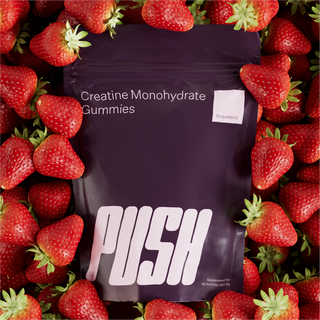A long-term fitness goal of mine is improving my upper body strength. I am a dancer and have always been strong in my legs and core, but could barely do a push-up. In the age of social media, it can be easy to fall into the trap of setting our goals based on others. When researching how to build upper body strength, the immediate answer you’ll find from Gym-loving ‘fitfluencers’ is to start lifting weights. And of course, there’s nothing wrong with that! Weight-training does in-fact build muscle and can definitely work for some. So, this is exactly what I did many years ago; I bought some dumbbells and created my own workout plan to complete at home. Should be easy, right?
After a few weeks, I gave up. I wasn’t interested in lifting weights and I hated doing it. Honestly, I felt like crap seeing all these amazing, strong gym girls on my feed doing exactly what I couldn’t, and wondering, why? We’re no different so why can they do it, and I can’t? I started to feel like I would never achieve my goal, and therefore never be at my ‘best.’
Fast-forward many years and I am here to share with you my secret to success. Not only can I now achieve full push-ups with ease, I enjoy doing upper-body workouts… and all without a single dumbbell in sight! How did I do it? The answer is much simpler than you’d think, and you’ll discover that aiming to be like or doing the fitness regimen of your favourite influencer has you working way harder than you need to be! The truth is, achieving your best and improving self-worth is about working smarter, not harder.
S – SPECIFIC
M – MEASURABLE
A – ATTAINABLE
R – RELEVANT
T – TIME BASED
SMART goals are a tool that can be used in any and all aspects of life, not just fitness. This acronym helps us to properly set goals that won’t have you feeling like your aspirations are a pipe dream. Don’t believe me? Statistically, people who do as little as just writing down their goals are 20% more successful in achieving them than people who don’t (i). Studies have shown that when goals are relevant and challenging (i.e. SMART), 90% of people perform better! (ii)
Video transcript:
[An early trap in fitness is often basing your best or what you want to achieve on others, especially in the age of social media. With all these fitness influencers, sometimes it can be really hard to see someone that's amazing and achieving all these goals and then getting really disappointed when we can't achieve those same goals and feeling like we're never going to be at our best. So a tool that I use that really helps me is smart goals because it's not enough just to set goals based on others. We have to be smart about it.
So what is a smart goal? Smart goals are specific, measurable, attainable and relevant and time based. So now that you have the tool of smart goals, I'm sure it'll be much easier for you to find out what your personal best is and therefore achieve your best.
So what does this mean? Well, how do I be specific? It's better to think of your goals smaller rather than the big picture. Now, of course, it doesn't mean you can't set long term goals, but if you are going to set a longer term goal, make sure to set smaller goals that you're able to achieve on the pathway to that larger goal. So something like, you know, especially if you are brand new targeting a specific area rather than just saying "I want to start taking classes" like maybe you want to start taking classes and make it through the core section of the class only stopping two or three times, something like that.
Moves us into our next point, which is goals being measurable. So something like I want to get a stronger core is a really hard goal to achieve because what does that even mean? What is a stronger core for you? Because this is different and subjective to everyone. So making your goals as objective and quantitative as possible is going to make them easier to achieve and therefore easier to achieve your best. So something like ``I want to hold a 30 second plank” rather than "I want a stronger core" is going to be an easier goal to achieve because you can actually measure your success in the goal.
And speaking of achieving goals, you need your goals to be attainable. So setting something like, you know, especially if you're brand new to fitness, you've never started, you don't have a whole lot of strength. Setting a goal like I want to hold a three minute plank is going to be hard to achieve right away. And you're going to find you're going to get dejected really quickly and probably abandon your goals altogether. So making sure your goals are attainable is going to help you achieve them and therefore achieve your best. So just always think smaller is better. And what is going to make this goal work for me? Not, you know, someone else setting a goal for you, having, you know, having this core blaster and six week type challenge thing where it's not personal to you, so you're going to get really frustrated really quickly. So something more achievable in terms of the plank would be to have a 30 second plank hold and once you achieve that a 60 second plank hold and then just work your way up to a full three minute plank hold. However long that may take you.
So the next part of smart goals, relevancy is also very important. You want the goal to mean something to you having some random goal. For example, if you hate high intensity interval training, setting a goal around hit training is probably not going to help you. You want it to be something that excites you and is relevant to you. So if you're someone that prefers more low impact exercise, maybe you want to base your goal around Pilates rather than hit training or barre rather than hit training.
So the final aspect of smart goals is time based, which just means that you want to set a certain amount of time within which to reach your goal. So something like I want to be able to hold a 30 second plank by the end of the month. You know, something that's, again, attainable for yourself or it can be something more repetition based in terms of time. So I want to take at least two Pilates classes a week and again, make sure it's attainable, not "I want to go do five Pilates classes in a week" if you've never taken a Pilates class before!
This is going to be a much more successful way for you to be working at your best, and that's always going to be changing. And improving your best is not a one set thing, and it's certainly not something based on someone else. Especially in social media, you never know how long that person or how hard that person has been working. So never base your self-worth and your personal best on someone else. Set goals that are personal and achievable to you, and I guarantee you you will find yourself achieving your best sooner than you know.]

Where I went wrong in my weightlifting routine was relevancy: I don’t enjoy lifting weights, it doesn’t excite me, so I wasn’t motivated to achieve my goal! Additionally, the workout routine I set for myself was not attainable for me as a beginner in weightlifting. What ended up working for me was Barre and Pilates, and the more bodyweight-based strength training. Not only were the workouts far more relevant to me as a dancer and therefore enjoyable, but building strength with my own weight rather than heavy dumbbells and far too many reps, was way more attainable! Ultimately, it’s important to know that your journey to your best is uniquely yours. Someone else may reach their goal sooner, but if we always focus on others (and trying to be where they are), it’s going to let you down in the long run.
Written by Sascha Czuchwicki
Works Cited
Indeed Editorial Team. SMART Goals: Definition and Examples. 2 November 2021. 8 May 2022. <https://www.indeed.com/career-advice/career-development/smart-goals>.
i) Matthews, Gail. "Goals Research Summary." n.d. https://boostprofits.com/wp-content/uploads/Goals-Research-Summary.pdf?x60870
ii) Locke, E. A., Shaw, K. N., Saari, L. M., & Latham, G. P. (1981). Goal setting and task performance: 1969–1980. Psychological Bulletin, 90(1), 125–152. https://doi.org/10.1037/0033-2909.90.1.125







